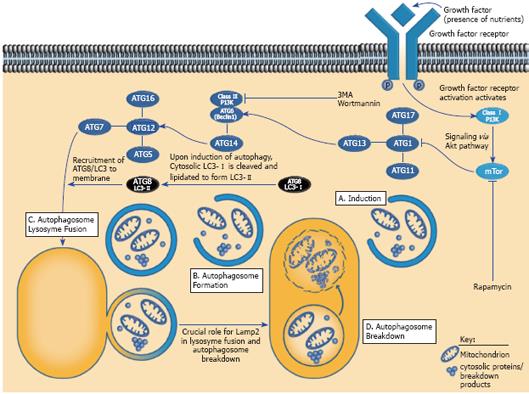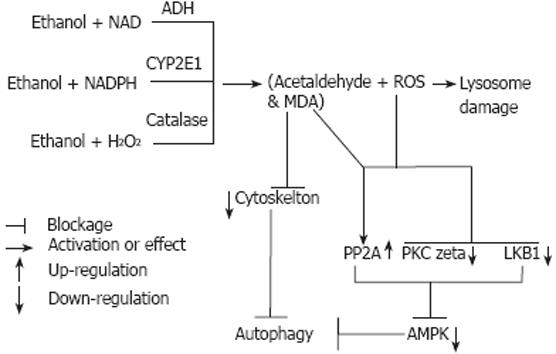©2009 The WJG Press and Baishideng.
World J Gastroenterol. Mar 14, 2009; 15(10): 1178-1185
Published online Mar 14, 2009. doi: 10.3748/wjg.15.1178
Published online Mar 14, 2009. doi: 10.3748/wjg.15.1178
Figure 1 Interaction of gene products and pathways in the regulation of autophagy.
Growth factors and nutrients activate the Class I P13K proteins, which, in turn, signal, via the AKT pathway to activate mTOR. This leads to inhibition of ATG1 - the primary signal for autophagy. Nutrient deprivation or inhibition of mTOR by rapamycin allows ATG1 to recruit ATG11, ATG13 and ATG 17 to form a complex to initiate formation of the autophagosome. This is dependent on the formation of 2 complexes: ATG 6 (Beclin1) which interacts with the Class III P13K protein complexes with ATG14. Another complex involves ATG12, ATG16, ATG5 and ATG7. The latter complex recruits ATG8 (LC3). Upon induction of autophagy, cytosolic LC3-I (ATG8) is cleaved and lipidated to form LC3-II. LC3-II is a marker for the autophagosome membrane. Fusion between the autophagosome and the lysosome and subsequent breakdown of the contents of the autophagic vacuole requires LAMP2 protein. Reproduced in modified form with permission (Abcam, Inc.) http://www.abcam.com/ps/pdf/cardiovascular/autophagic.pdf).
Figure 2 Putatative mechanisms of autophagy suppression by ethanol.
Ethanol metabolism by the three major pathways, alcohol dehydrogenase (ADH), cytochrome P450 2E1 (CYP2E1) and catalase generates acetaldehyde, which can undergo secondary reactions with malondialdehyde (MDA) to form MAA. In addition, reactive oxygen species (ROS) are generated by CYP2E1 catalysis. Reactive oxidants (ROS) may also contribute to lysosomal damage. The reactive aldehydes are known to form adducts with tubulin and other cytoskeletal elements to block trafficking and movement of autophagic vacuoles and their formation. The combined formation of ROS and acetaldehyde putatively cause upregulation of protein phosphatase 2A (PP2A) and a downregulation of LKB1 and PKC zeta. The latter changes cause inactivation of AMPK, which in turn suppresses autophagy due to up regulation of mTOR (not shown) as described in the text.
- Citation: Jr TMD. Autophagy and ethanol-induced liver injury. World J Gastroenterol 2009; 15(10): 1178-1185
- URL: https://www.wjgnet.com/1007-9327/full/v15/i10/1178.htm
- DOI: https://dx.doi.org/10.3748/wjg.15.1178














